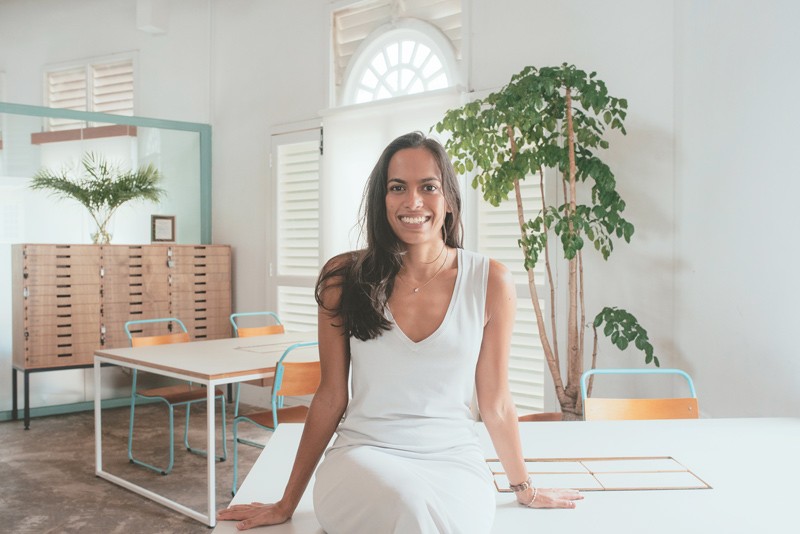Saranta Gattie: The Heart of a Community

It’s the start of an early Saturday morning at The Working Capitol, and the atmosphere is bustling with activity. A programme-packed day lies ahead: a Communication Design graduate show is being readied for opening night, breakfast meetings are slowly commencing in the members lounge, sub-contractors are hurriedly hanging up fixtures—when Saranta Gattie arrives. We meet at the front desk reception of the building, a sprawling complex of five shophouses that was once a 1920s biscuit factory, now housing the likes of independent film makers, big-dreaming start-ups, and promising companies coming out of Singapore’s tech scene. We’re trying out different areas in the building to find a perfect spot for her portrait to be taken. As we climb up the stairs that lead to various sections, I’m not just taken in by the stunning spatial design created by interior consultants Takenouchi Webb, but also drawn to the long dress that cascades down Saranta’s slender frame as she leads our tour. It’s a casual, simple cotton dress in a shade of nude that compliments her sun-kissed skin, yet she wears it with effortless ease and poise. Her outfit is also perfectly accessorised by a smile that lights up a room, and there is an air of quiet elegance—a certain je ne sais quoi that is captivating. Everything about Saranta, in fact—the easy eye contact, casual laughter and willingness to play host, adds to her appeal. As we move through the corridors of The Working Capitol, I notice a constant buzz of chitter-chatter that leaves a faint echo. Saranta pauses now and then to speak to passing staff and members with a fond interest to hear about their day, family or work updates. “People are the centre of everything I do,” she tells me, and I have no doubts about that. Everyone walks into a room with a different presence. Some enter loudly, demanding your attention right away even if you’re unprepared to give it. Others slip in quietly, only to fill it the room with their presence gradually—like the aroma of coffee beans roasting that invites you through the doors of a new cafe—drawing you in. This is the case for Saranta, and her genuine warmth makes me feel like I am speaking to an old friend, forgetting this is an interview.
SHANNON WEE: Have you always been involved in the start-up industry?
SARANTA GATTIE: While I was still exploring my career, I dabbled in my brother’s other business, which didn’t quite work out. Real estate didn’t resonate with me, so I pursued my own path instead, which found me in Myanmar. I’ve always had this really strong interest in the country during my university days when I wrote my thesis on it, so it felt like the right time to head there in 2013. It was there when I was exposed to the start-up scene, and their first-ever and only co-working space. A lot of young locals were returning to their homeland to start their own businesses, and that co-working space was where I met so many of them. It was also the first stop for many foreigners who were just exploring the country—entrepreneurs, business owners… and the mix of people created an exciting buzz to the whole community, especially for such a young country that was still in the process of building its economy. Infrastructure was limited and we only had basic internet. During that time, I still travelled back and forth to Singapore, and it just so happened that my brother had his eye on a piece of property. It took him about a year to secure it, but once he did, the pieces naturally fell into place—it was the right concept, at the right time.
SHANNON: How has your experience in Myanmar influenced you today?
SARANTA: It definitely helped me figure out how to put myself out there, and learn how to make connections out of nothing. I arrived in Yangon not knowing anybody—I had to figure out how to meet the right people, and where to find and create my own community. There is a dinner series you might have heard of called “9others”, which brings entrepreneurs together through intimate meals. I joined a few sessions in Singapore and really enjoyed it. It was a great way to gather interesting individuals from diverse backgrounds, and I thought it would be good to try it out in Yangon so that the small start-up community could get to know each other better. There was still a silo mentality as the Yangon start-up industry was literally in its infancy stages, without a proper networking infrastructure to tap into—unlike what we have in Singapore. I held a few of those dinners which became a catalyst for building stronger relationships within the startup community, and that taught me the importance of seeking out your own network.
SHANNON: How was the idea of The Working Capitol conceptualised?
SARANTA: I wasn’t interested in creating a traditional service office. If it was just going to be a space for people to simply sit and work in, I wouldn’t have gotten involved. However, as we were exploring the different concepts out there, the building blocks of our foundational concept started to form, and I saw my opportunity to get involved.
SHANNON: What was it like in the beginning when The Working Capitol first launched?
SARANTA: It was pretty scary. It was my first venture, so being thrust into the public eye took getting used to. I had no idea how it was going to go or how people would respond. Thankfully, we had a lot of support from the consultants we worked with and that was our first way to build a network even before we launched. Those connections were the basis of how we started building our community.
SHANNON: Was community-building a conscious effort from the start, too?
SARANTA: It was always going to be a space for experiences. You can’t really proclaim: this is the community that I want, this is how it’ll happen—and then it magically appears. It’s really something that has to organically take a life of its own. You need to have faith to let it run its course. I also feel like the word “community” gets talked about a lot. It’s out there, but what does it really mean? How do you really enable it? I think we only really felt our community solidifying a year after our launch. It takes time to build one, for people to organically come together and connect. But when you see it and feel it—that’s something truly special.
SHANNON: How did you decide what to focus on during the early days to get traction?
SARANTA: This building alone holds its own natural beauty—its historical and beautiful, with a very good energy. We wanted to build on its raw charm, and take advantage of it. When we found it, we could immediately envision the potential it held for someone to effectively use the whole space for gatherings and events. So, we invited lifestyle, fashion and design brands that we felt inspired by to use the space for their events. That was extremely helpful for us in figuring out how to fully utilise the building’s potential and getting people in, but I think everyone was still wondering, what is this space exactly? What do they do? Actually, the concept of private work spaces isn’t new. During our early stages, people were still figuring out how it would benefit them being in a space like ours, compared to your typical service office or other co-working solutions. We spent a lot of our time researching, testing the waters, and learning more about what our audience wanted by trying out different programmes and holding smaller events. I strongly believe that when you give people the platform, it’s all about what everyone brings to it that makes it distinctive and unique. We see ourselves as the platform that helps individuals and companies co-exist. We do this by supporting their ideas and growing together with them.
SHANNON: I’d have to agree. This is my first time in The Working Capitol, and there seems to be a different energy here. It’s energetic, and honestly, a place I wouldn’t mind working in.
SARANTA: Thank you. That’s something I hear a lot whenever someone steps into our building. They feel a different kind of energy and buzz —and it’s an immediate result of how design can interact with spaces to influence culture and an environment’s energy. On top of that, the team we’ve put together fully supports our vision and is the cornerstone to this. They are the very reasons why visitors and members feel so comfortable and at home here. This core team is currently about 12-strong and as we expand, we’ll have to relook into our structure and how it works across our multiple sites so that this core energy is never broken.
We want to be a space where both the small and big guys are on the same playing field.
SHANNON: About expansion—could you tell me more about the future plans? It’s been over a year since your launch and it sounds like you’re already looking at opening new spaces.
SARANTA: The intention from the beginning was to never stop at just one location. We set out to grow the brand and create a network of sites for people to benefit from, build their own companies, and take advantage of us growing into different markets. Currently, we’d still like to establish our presence in Singapore a bit more—especially now that people know who we are and the interesting mix of businesses that are in the space. All of these are also shaping how we look at different sites that we go into. Are we able to accommodate the types of companies that are coming to us? How can we study the needs of the larger organisations? We hope that our next site will be even larger than the current one, so that we are able to accommodate much bigger companies. We want to be a space where both the small and big guys are on the same playing field.
SHANNON: What is the long-term vision for The Working Capitol then? Will the brand always be rooted in co-working spaces, or are you looking into expanding the brand beyond that?
SARANTA: We’d really like to integrate into different markets and deeply root ourselves into the lifestyle and culture of these markets. We envision being an integrated space across F&B, lifestyle, and corporate sectors. Also, the potential to diversify the brand was the first daunting thing we faced as we were growing. There are so many legs, multiple directions that the brand can explore, but where is our true focus and vision? Events are definitely something we want to continue and we’re also working on building a lot more thought-leadership around our content. On a daily basis, so many individuals interact with this space, so there’s never a lack of stories we can create and share.
People are the centre of everything I do.
SHANNON: The touchpoints for a brand like The Working Capitol are so important, especially with the breadth of people experiencing it, and there is an obvious consistency in yours. If a person is not looking to rent a working space, what do you want him or her to feel when they first walk in?
SARANTA: It might sound a bit cliché, but our wish is for them to feel inspired when they walk in. It’s about knowing you’re going to have the support no matter what you do, and that we’re here to inspire and facilitate your dreams and needs. In the case of start-ups and SMEs, the founders are usually very heavily involved in all aspects of the business. There is so much personal growth they’re going through, while at the same time, they’re constantly juggling the needs of growing their businesses. I believe that it’s important for us to support both the business aspect and their personal well-being. We’re looking after people. That’s our main goal.
SHANNON: That’s an interesting point to make. It’s not often we hear someone speak about personal growth when the topic of work is brought up. I can tell you’re very much a people person.
SARANTA: Oh, yes. People are the centre of everything I do. Running The Working Capitol has intensified my interest in people and their growth. Being part of a start-up entails dealing with a long list of tasks, and juggling multiple hats. I want our people to grow with the company, and also see a future with us—career wise. Staying inspired and interested outside of work is key, too. We even hold meditation nights because I feel that the practice of mindfulness allows you to clear your head and focus.
SHANNON: What are your guiding values at work?
SARANTA: I focus on the community, partnerships, and programmes at The Working Capitol—essentially relationship-building. My priorities are the people I work with, and the people I’m serving and supporting. I think great relationships lay the foundation for a successful business. I’ve never really been driven by money but I am also learning how to balance the commercial aspects of running a business. For example, how to think creatively in order to diversify our revenue streams—especially for our type of business, where it can come from so many varied avenues. That’s something we want to train the team to think about as well. At the end of the day, our common goal is to build a sustainable and thriving company together.
SHANNON: What are your personal KPIs, in business and in life?
SARANTA: Similarly, it’s all about my relationships—being present for my friends and family. Those are the ties that ground me and support me, especially through the crazy journey of starting your own business. A lot of my friends are on that trajectory as well; everyone can sometimes get completely immersed in their own business, so it’s important that we continue to touch base and support each other. On a personal level, I’m focused on improving myself as a human being. I’d really like to start learning more hard skills, but I’m not sure what exactly yet.
Our interview gets sidetracked by one of the lighting technicians, who is trying to fix a faulty ceiling lamp next to us. Saranta and him exchange a few words. I listen in to their conversation, which is peppered with laughter and an obvious camaraderie between the both of them, much like a conversation between close friends. They talk about family (“Is your wife doing well?”), breakfast (“Aiyah, just tea, lah.”) and their day ahead.
SHANNON: I love the way you interact with your staff. You seem to know them well. What is it like to work with a team, which includes your own brother? Do family politics ever get in the way?
SARANTA: It has been an interesting journey working with my brother [Ben]. Initially, it wasn’t easy to separate our personal and professional lives. When you have a team to lead, you want to maintain a level of professionalism, but at the same time, some of our staff have told us that they appreciate working in a sibling-run business, where they feel like they are part of a family. Our individual roles in the business have developed over time as the company has grown, and it has been a privilege witnessing Ben grow professionally. Working together has increased our respect for each other as colleagues and siblings.
The power of word-of-mouth is what I believe will sustain the community.
SHANNON: How were you able to attract your first few clients to set up their offices here?
SARANTA: To be transparent—we don’t have a sales team, although we really ought to. It was through pure word-of-mouth and referrals, which are in truth, much stronger than any traditional sales technique or campaign. The power of word-of-mouth is what I believe will sustain the community—ultimately, you will bring in the people you want to be around, and that allows us to find the right kind of people who want to be part of our community. Although our members make up our core community, we still make an effort to reach out and support other communities outside of The Working Capitol. We are heartened by how different communities come together to collaborate and look out for each other.
SHANNON: This seems like the perfect space for an independent, where it isn’t corporate or cold.
SARANTA: These days, there are so many options out there for co-working spaces. People are a lot more discerning as well, so they want something that best suits their business and personal needs. You can’t force people to be part of your community—they have to be attracted to it.
SHANNON: What will continue to differentiate The Working Capitol from the rest?
SARANTA: Our focus now is to integrate stronger lifestyle experiences into the business, so that as a member, you get all the health and wellness, lifestyle and F&B benefits. We also put a lot of emphasis on personal growth for our people, and being a space where companies can attract top talent because of the environment, networks, and connections that people can make here.
SHANNON: Finally, what occupies your time outside of work?
SARANTA: I enjoy yoga, meditation, and conscious living.
****
Edited by Wy-Lene Yap





